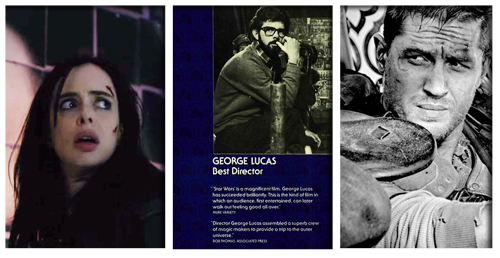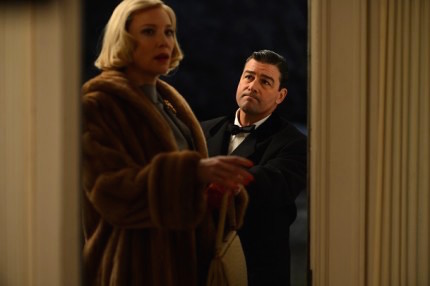I link. I die. I link again!
 Monday, December 14, 2015 at 7:40PM
Monday, December 14, 2015 at 7:40PM Daily Mail Tim Burton's type is hilariously permanent. Now he's on to Eva Green who fits it like a T
New Yorker The brilliant Emily Nussbaum on sexual consent and PTSD on Jessica Jones and its Buffy The Vampire Slayer Season 6 reflections
DGA Chris Nolan interviews Quentin Tarantino about The Hateful Eight which will now enter wide release on January 1st instead of the 8th.
Slate reflects on what the Star Wars franchise is given that it's not "sci-fi"
Variety has a few old FYC and congratulatory ads for Star Wars from the 70s. Good stuff
Vanity Fair today's celebrities all want to be Han Solo

News
The Black List If you've got some free time you can wade through Hollywood's favorite unproduced scripts. List was just announced today.
Collider Mad Max Fury Road may return to theaters in a black & white version -- Miller's original intention before they opted for super saturated color.
Variety Brad Pitt's satire War Machine wraps shooting in the United Arab Emirates.
Tracking Board Warner Bros is moving forward with a Speedy Gonzalez feature, date TBD. (He was my second favorite of the Looney Tunes as a child, after Pepe Le Pew... but they both have cultural stereotyping issues. How will they walk that line?)
Variety Melissa McCarthy is nearly free of Mike & Molly
List Mania
Slant picks the 25 best films of the year from 45 Years through Chi-Raq and on to Mad Max: Fury Road. But since Carol is way down at #19... What?
Los Angeles Times Brooklyn tops Kenneth Turan's otherwise alphabetical top ten
Indie Wire critics poll for the year with Mad Max & Carol fighting for supremacy. Fassbender & Rampling take the acting prizes
Pajiba celebrates the best 'comfort movies' of the year - not particularly challenging but great watches from your couch in your jammies: Cinderella, The Intern, and more...
AV Club on the best film scenes of the year including Creed's continuous shot boxing match and lots of interesting and unexpected choices -- yay for including "Summer in Ohio" from The Last Five Years
Today's Watch
If you've got a free two hours you can watch all six previous Star Wars movies at once? It's an art installation. Click on the image if you wish to do this craziness.









